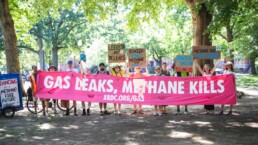An inside look at the vision and strategy behind Extinction Rebellion D.C.’s campaign that is blocking $12 billion in new fossil fuel infrastructure.
By Abby Shepard, Z Network
Last month, Extinction Rebellion D.C. scored a major victory for the End Methane, Electrify D.C. campaign: the D.C. Public Service Commission dismissed corporate utility provider Washington Gas’ application for the third phase of their $12 billion fossil fuel pipeline replacement project dubbed Project Pipes. The commission also partially approved a petition to investigate Washington Gas’ leak reduction practices.

This victory is a major milestone in the fight to shut down a fossil fuel project that would lock D.C. into decades of planet-warming emissions while poisoning the city’s residents, especially the communities that are most marginalized and underserved.
The fight to stop Project Pipes is not over, but last month’s victory marks a major shift in the Public Service Commission’s approach to the regulation of utilities in D.C. and their alignment with D.C.’s climate goals.
While this was the work of many groups across D.C., Extinction Rebellion D.C. played a crucial role through our core strategy of nonviolent direct action, or NVDA.
Recent Posts
‘Unconstitutional. Unethical. Authoritarian.’ ICE Bars Millions Of Immigrants From Bond Hearings
July 18, 2025
Take Action Now One watchdog said the new policy “seems like a blatant attempt to stop them from exercising their right to due process.”……
Americans Are Not Nearly Alarmed Enough About Climate Change
July 18, 2025
Take Action Now Americans still don’t comprehend how imminent, dangerous, and far-reaching the threat is—and journalists are partly to blame.By…
The IRS Is Building A Vast System To Share Millions Of Taxpayers’ Data With ICE
July 17, 2025
Take Action Now ProPublica has obtained the blueprint for the Trump administration’s unprecedented plan to turn over IRS records to Homeland Security…
Israel’s Sudden Assault On Syria Is Unchecked Aggression
July 17, 2025
Take Action Now Jerusalem is bombing Damascus and threatening al-Sharaa’s rule, while Washington was hoping to help the nascent government on…




